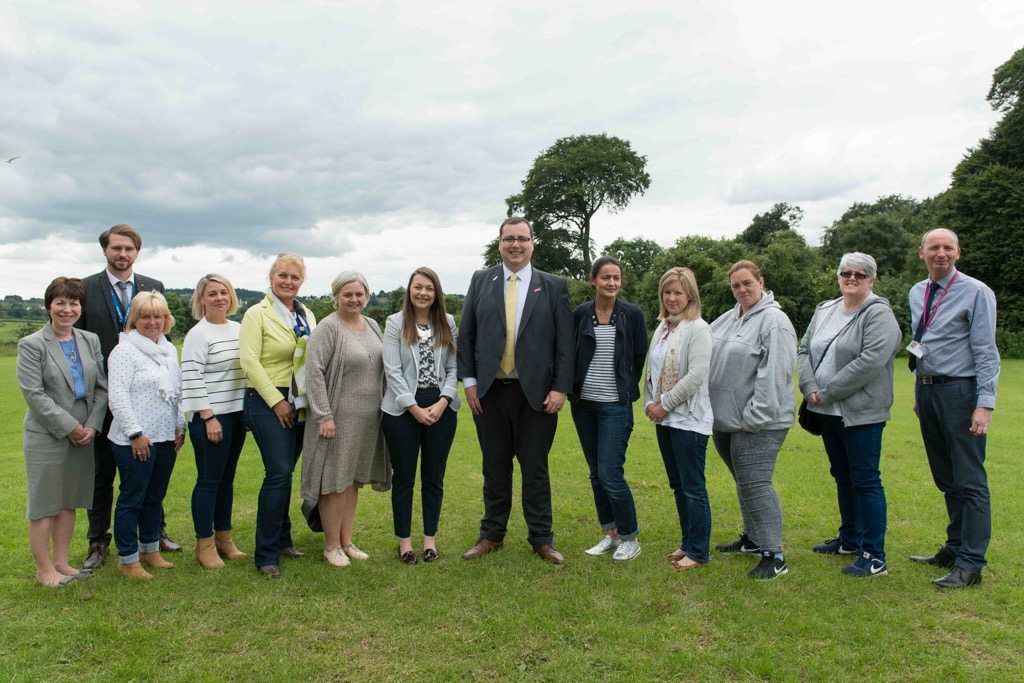BBC Rip Off Britain Live
October 9, 2017Paisley statues yarn bombed
October 10, 2017An innovative education project is helping Renfrewshire pupils to reach their full potential by inviting their parents to get back into school.
Parents of pupils in three secondary schools – Gryffe, Castlehead and Trinity High – were invited to take part in a pilot of the Parents in Partnership programme between August and October 2016 as part of a series of projects supporting Renfrewshire Council’s ambition to close the poverty related attainment gap.

The pilot project – funded by Renfrewshire Council in association with the Centre for Excellence for Looked After Children in Scotland (CELCIS) at the University of Strathclyde – assessed how a child’s attainment might relate to parental or carer involvement.
CELCIS, who work with local authorities to make lasting improvements in the wellbeing of children and young people living in and on the edges of care and their families, looked at how the programme made a difference for parents and the benefits it had on pupils, with the results published in the report Parents in Partnership 2016 Evaluation.
Parents, who attended school one morning a week for six weeks, said that the flexible model of the programme meant their unique family circumstances were taken into account and they were supported by the Homelink service, who work with identified pupils and their families to improve achievement and attainment.
One parent explained that attending the sessions helped open the lines of communication, while another said it was now much easier to approach the school to ask for support.
Teachers also found that parents were able to read with their children more often once they realised it only needed to involve fifteen minutes of reading and a chat afterwards.
Renfrewshire Council’s Convener of Education and Children’s Services Policy Board, Councillor Jim Paterson, said: “Renfrewshire is ambitious for our pupils. We want all young people to reach their full potential, regardless of their background.
“Reducing the impact of poverty on attainment is a key priority for the Council and being part of Scottish Government’s Attainment Challenge, supported by the Pupil Equity Fund, is a big deal for Renfrewshire’s children.
“We’ve already seen results from adopting the Renfrewshire Literacy Approach in partnership with the University of Strathclyde, which has seen teachers adapting teaching styles to develop a love of reading in all pupils.
“We know involving parents and carers in school life is a great way to support pupils, with parents encouraging reading at night and that has a knock-on effect to how well the child does at school.
“The report by CELCIS shows good progress on supporting those who need that extra bit of assistance through school and reinforces that parents and teachers are all working together to provide the best opportunities for children.
“High school is an unknown world for parents, so being able to involve them in the school day and encouraging more communication between teachers and parents has been incredibly beneficial.
“Parents have told us that they have benefitted from understanding high school life, felt they could talk to their child more about school and that they had much more confidence in approaching the school for support, while pupils have also felt they have more support at home.
“We will continue to build on the project, responding to the needs of parents and carers as well as the pupils across Renfrewshire schools.”
Linda O’Neill, Education Programme Lead from CELCIS, who developed this approach, said “We know that working with parents and carers in a meaningful way through school has the real potential to support family learning and improve the wellbeing of both children and their parents and carers. It’s great to see Renfrewshire Council making a commitment to develop real and lasting partnerships between parents, schools and communities though Parents in Partnership”
All secondary schools in Renfrewshire, including the Mary Russell School, run similar parental engagement programmes.
To find out more about the Parents in Partnership programme evaluation, visit www.celcis.org.
Ends
Notes to Editor:
1. Image caption:
Parents from Gryffe and Castlehead high schools with Anne Marie Haddow, Deputy Head at Trinity High School, Chris Anderson, Principal Teacher (attainment) at Gryffe High School, Jim Russ, Education Support Manager at Castlehead High School, Linda O’Neill of CELCIS and Cllr Jim Paterson, Education adn Children’s Services Convener at Renfrewshire Council.
2. To read the full report, visit www.celcis.org/knowledge-bank/
3. Renfrewshire Council Home Link Service aims to help parents engage in supporting their children’s education. Research suggests parental engagement in education makes an important contribution to a child’s educational attainment throughout the school years. This is particularly true for children from disadvantaged backgrounds.
4. In Scotland a child’s socio-economic status is the strongest predictor of educational attainment, which leads to a significant gap in attainment between pupils from the least disadvantaged and those from the most disadvantaged backgrounds (OECD, 2010). Current research indicates that “only parental involvement makes a significant contribution to closing the attainment gap” (JRF, 2014).
5. CELCIS, based at the University of Strathclyde in Glasgow, is committed to making positive and lasting improvements in the wellbeing of Scotland’s children living in and on the edges of care. Taking a multi-agency, collaborative approach towards making lasting change, CELCIS works alongside leaders, managers and practitioners to break down barriers and forge new paths in order to change thinking and ways of working with everyone whose work touches the lives of vulnerable children and families. CELCIS builds on national experience to inform its work in different countries around the world and plays a key role in the work of the University’s Institute for Inspiring Children’s Futures.



